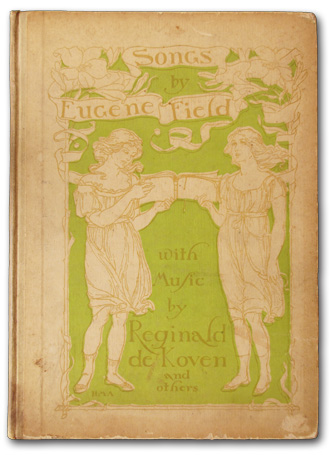
Verses by Eugene Field
Music by Reginald De Koven
c1896, Scribners
Eugene Field House
Descriptive Detail
The cover of this parlor songbook for the piano features two winsome young ladies in fluid neoclassical dresses holding a book between them as they stand under gracefully curling ribbons spelling out Songs by Eugene Field (also called Songs of Childhood). Twenty poems were selected for this particular book, including one of his most well-known and well-loved poems, Dutch Lullaby (also known as Wynken, Blynken and Nod or Three Little Fishermen). Each poem is surrounded by elegant borders of leaves, vines, and flowers and precedes the musical composition created from the poetry.
Local Historical Connections
Eugene Field was fond of music and played the guitar. His father Roswell played the violin, and it is known that they had a piano in their home. Perhaps the love of music carried over into his writing. His poetry, often geared toward children, was rhythmical and rhymed, a natural for turning into song and sheet music. While there are many new and different editions of his poetry and prose writing, these early scored poems are unusual and a tribute to his popularity. This book was published a year after his death. It is also a tribute to his popularity that a well-known composer of the time, Reginald de Koven, wrote music for his poetry.
National Historical Connections
As the piano became a status symbol for the middle-class home, the nineteenth century witnessed a massive explosion in the popularity of parlor music, which caused the sheet music industry to flourish as the CD of its time. A group of New York City-based publishers and composers known as “Tin Pan Alley” dominated the industry, providing the rest of the country with the songs they demanded. Part of the success of sheet music was due to blackface minstrels—whites singing with their faces painted black. It was the most popular form of live entertainment in the United States through much of the nineteenth century and provided one of the central vehicles for publishers to acquaint audiences with their wares. Large minstrel companies became celebrities by touring relentlessly through established national theater circuits. Their endorsement of a song could result in significant sales throughout the nation.
When the phonograph appeared in the early twentieth century, sheet music began to lessen in importance. The invention of the radio in the 1920s continued the decline. Eventually the record industry replaced sheet music publishers as the music industry's most influential force. It is not surprising that today you can download whatever sheet music you like from the Internet.
top^
next artifact}
|




